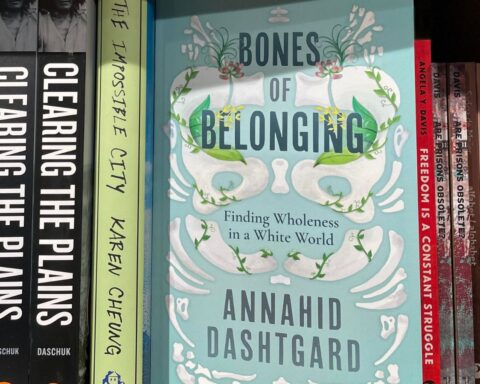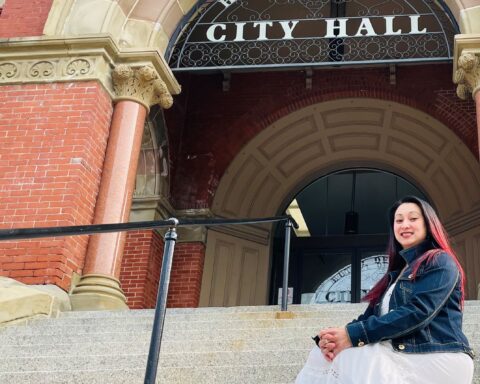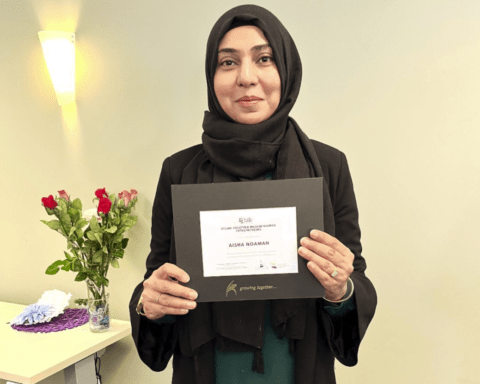The histories of Canadians are plentiful, rich, and complex. We can never know all of them, but even sharing just a few can open windows into many unknown pasts.
Coming Here, Being Here: A Canadian Migration Anthology brings together people’s stories of arriving in Canada, as told through first-hand accounts and by those who have studied immigration and helped newcomers along the way.
Edited by Donald Mulcahy, this collection of stories about the immigration experience seems a long time coming. It is the first time I have had the chance to read about such a wide scope of experiences from across the country in one book.
On the other hand, this collection could not have come at a better time, as we seem of late to be in need of reminders about how integral these stories are to our national identity.

Struggles and successes
In the story titled “They Left Their Homes with Nothing, and Made a New Life with Hard Work,” Dana Borcea shares the stories of some of the 6,000 Vietnamese refugees who came to Edmonton 25 years ago as “boat people.” Learning about their struggles and successes, I could not help wondering what stories the newly arriving Syrian refugees will tell in 25 years about coming to Canada.
Like the stories of refugees from Vietnam, they will undoubtedly include working at menial jobs to support their families, struggling to learn a new language, and adapting to a new culture. Will they also realize their dreams for peace and belonging?
Another story I know will stay with me for a long time is “Prejudice,” by Anton Capri. It recounts the author’s arrival as a DP, or displaced person, in Canada after the Second World War. At his first baseball game, the other children laugh at the boy who can’t hit the ball – except Dave, who becomes young Anton’s first friend.
Anton feels guilty that the other students now shun both him and Dave, yet to his surprise Dave thanks him for being his friend. The impact of this short narrative is felt in its ending and for that reason cannot be revealed in a simple summary, but it is sure to leave readers pondering about the lengths and limits of that ugly word – prejudice.
Our privileged lives
The stories also present diverse viewpoints on the present state of immigration in Canada. Monica Kidd writes in “The Music of Small Things” about being “purple with rage” at the government after seeing the photo of the lifeless body of Alan Kurdi – a young boy who escaped the current violence in Syria, only to be swept up on a beach in Turkey.
“We lived privileged lives in a wealthy country and would find a way to sponsor a refugee family,” Kidd decided with her friends.
Meanwhile, the prominent author Henry Beissel calls Prime Minister Justin Trudeau’s decision to settle 50,000 Syrian refugees in Canada in 2016 “hasty,” adding that the government did so without regard for demographic and security concerns. His suggestion that this will lead to the creation of ghettos, the “breeding ground of discrimination and racism,” contrasts with the image of a welcoming and pluralistic Canada described in an essay he delivered in 1985, also included in his contribution to this anthology, titled “No Country for a Master Race.”
Story after story in this anthology illustrates the challenges people must overcome to arrive here, and how hard they must work to stay and ultimately belong here.
They ultimately serve to keep us grounded in the reality of the immigration experience amid the xenophobic rhetoric the media bombards us with on a daily basis.
Inventing enemies
Even the notion that our values and customs are under threat seems to be challenged when in “Writing in French in Alberta,” Laurent Chabin points out:
“No one threatens a language that is freely used, and there is no reason to invent enemies when all one really needs to do is practice and write in one’s own language.”
This can be said of all the traditions Canadians hold dear and fiercely protect. The best way to defend these qualities – which in my mind include equality, respect, and generosity – is to practice them freely.
As Batia Boe Stolar writes in “I Am an Immigrant,” though they carry some burdens, the experiences of immigration should be accepted and acknowledged.
“Identifying myself as an immigrant is a self-conscious act that grants me a degree of agency, allowing me to exert some control over my identity,” she writes.
“I must here confess that there is a part of me that sometimes relishes the fact I have a story to tell that others crave to hear…. My markings open doors and close others; they generate other stories about other people’s experiences too.”
Here’s to hoping this collection of stories is a spark that ignites others to tell of the victories celebrated and hardships endured in coming to this country and calling it “Home.”





